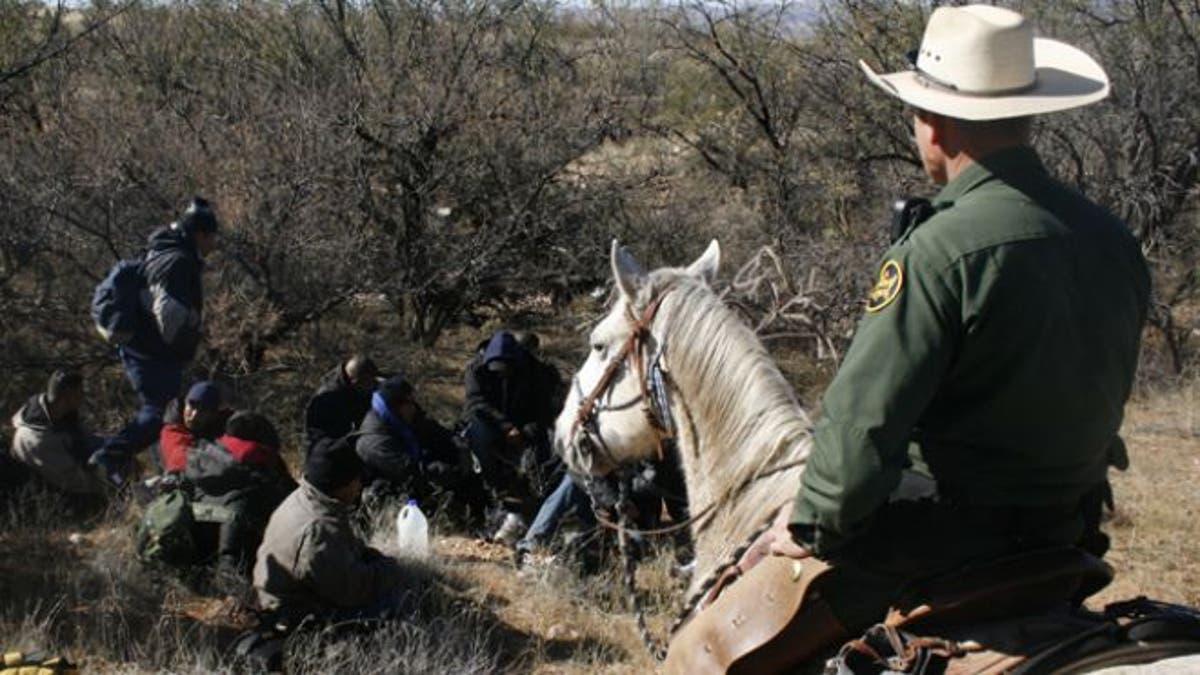
FILE: Jan. 9, 2008: A U.S. Border Patrol agent watches over a group of immigrants arrested after crossing illegally from Mexico through the Altar Valley in Arizona. (Reuters)
PHOENIX – Arizona’s most populous county halted prosecutions on Monday of smuggling suspects and the people they allegedly bring to the United States.
The move came after U.S. District Judge Robert Broomfield ruled Friday that a 2005 state law doesn’t allow Sheriff Joe Arpaio or county prosecutors to charge immigrants with conspiracy if they arrange to be smuggled across the border. Broomfield said the policy criminalizes actions that federal law treats as a civil matter.
‘‘It is hard to imagine a more blatant conflict than that,’’ the judge said in his 60-page ruling.
Maricopa County Attorney Bill Montgomery said the order doesn’t specifically bar prosecution of smugglers. Still, he said he cannot ethically allow any prosecutions under the law because Broomfield’s reasoning may have broader implications.
A lawyer for the county, Tim Casey, said Broomfield will be asked to clarify the scope of his ruling while the county considers whether to appeal.
Montgomery said the freeze applies until a federal court explicitly allows prosecutions under the state smuggling law.
Seventy-five percent of the approximately 1,800 people charged under the smuggling law in Maricopa County through June 2011 were facing counts of conspiring to sneak themselves into the country.
That drew complaints from immigrant rights advocates that the statute was intended for often-violent smugglers, not their customers, and that the prosecution policy was pre-empted by federal immigration law.
‘‘The federal courts are clearly saying that states have no role in protecting their own borders,’’ said Casey Holguin, a lawyer for the activists who challenged the policy.
Attorneys defending Maricopa County and Arpaio had argued that the interpretation didn’t conflict with federal law. They also pointed out that Arizona law allows people to be convicted of conspiracy, even when they can’t be convicted of the underlying crime itself.
The state smuggling law was passed in 2005 as lawmakers responded to voter frustration over Arizona’s role as the nation’s busiest immigrant smuggling hub. It was followed in 2010 with a wide-ranging statute that inspired similar laws in Alabama, Georgia, Indiana, South Carolina and Utah.
Several weeks after the smuggling law took effect in August 2005, Maricopa County’s then-top prosecutor issued a legal opinion that said immigrants suspected of using smugglers to enter the country illegally can be charged as conspirators. Maricopa County is the only county in the state to use the conspirator interpretation for the smuggling law.
State courts upheld the legal interpretation of then-Maricopa County Attorney Andrew Thomas, but critics continued their fight in federal court.
The suit challenging the policy was dismissed, but the case was revived in July 2010, when an appeals court ruled that a trial judge erred in dismissing organizations and taxpayers who challenged the prosecution tactic.
Those pushing the lawsuit — the Arizona Hispanic Community Forum, the Hispanic civil rights group Somos America, former Democratic state Sen. David Lujan of Phoenix, and Arizona State University professor LaDawn Haglund — weren’t seeking monetary damages. Instead, they asked Broomfield to declare the policy unconstitutional and bar county prosecutors and Arpaio’s agency from bringing conspiracy cases forward.
Fighting illegal immigration has been a central part of Arpaio’s political identity over the past seven years as he argued the federal government wasn’t doing enough. But Arpaio’s immigration enforcement powers have been sapped since October 2009, when Washington stripped some of his officers of their power to make federal immigration arrests. Arpaio continued by enforcing Arizona’s smuggling law and another state immigration law.
In a separate racial-profiling case in federal court, a judge in May ruled that Arpaio’s department had systematically singled out Latinos in its immigration patrols.









































